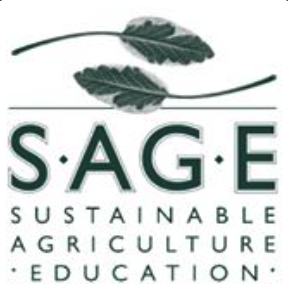SAGE Welcomes Poppy Davis as New Program Director, One of Our Own
SAGE’s New Program Director Poppy Davis to Expand Organization’s Capacity for Cultivating Urban-Edge Agricultural Places
Sustainable Agriculture Education (SAGE) welcomes Poppy Davis as Program Director to expand the organization’s capacity and develop and implement strategies for revitalizing urban-edge agricultural places that sustain and define cities. SAGE is a lean, entrepreneurial nonprofit organization headed by Sibella Kraus, recipient of the 2014 Growing Green Regional Food Leader Award from the Natural Resources Defense Council.
Working through multi-partner collaborations, SAGE develops place-based projects, toolkits and conceptual frameworks to demonstrate strategies for urban-edge farmland preservation, regeneration, and re-connection with healthy cities. SAGE also provides agriculture-related technical services such as foodshed and agricultural economic viability assessments, implementation plans and business plans. Partners include public agencies, land trusts, agricultural enterprises and associations, planning and economic consultancy firms, public-interest organizations working in the area of public health, healthy food access, education and conservation, and community groups in urban and rural areas.
Sibella founded SAGE in 2001 to use her background in agricultural marketing, education and journalism, to help diverse stakeholders embrace urban-edge agricultural places as keystones of urban and regional sustainability. Bringing Poppy on board strengthens the organization’s capacity to work with the agricultural community, particularly retiring landowners and beginning farmers and ranchers who are eager to benefit from new opportunities at the urban-edge.
Poppy began her career as a California Certified Public Accountant specializing in family-scale agricultural businesses and associations. She translated her intimate knowledge of agricultural issues and farm-family decision-making to the policy arena, working for the United States Department of Agriculture (USDA), first for the crop insurance program in the Western Region and most recently as the National Program Leader for Small Farms and Beginning Farmers and Ranchers in Washington, D.C.. While at the USDA she served as a member of the management team for Secretary Vilsack‘s “Know Your Farmer, Know Your Food” initiative,
and co-founded the USDA 4 Veterans, Reservists & Military Families, and Women and Working Lands workgroups. She holds a Bachelor of Science in Agricultural Economics from the University of California, Davis; a Masters in Journalism from Georgetown University, and a Juris Doctor with a certificate in Agricultural Law from Drake University Law School. Poppy is also a past fellow of the California Agricultural Leadership Program (Class 35) and has served on a number of nonprofit boards including the Farmer-Veteran Coalition, Center for Land Based Learning, and Community Alliance with Family Farmers.
“We are delighted to welcome Poppy to SAGE,” says Kraus. “Poppy’s breadth of experience – providing services to farmers, working for ag-focused nonprofits and for the USDA – and the respect she commands in the California and national agricultural communities, make her the ideal person to help SAGE grow our mission to cultivate urban-edge places that model sustainable agriculture integrated with resilient communities.” For her part, Poppy says, “I have long respected Sibella’s vision and work, and I think we will make a great team. Sibella already has many forward-thinking projects in the works, and I’m looking forward to working with SAGE’s diverse partners, as well as bringing in collaborations of my own.”
SAGE’s areas of expertise, services and publications include:
- Technical consulting and visioning on the agricultural components of land-use projects and policy documents
- On-the-ground models and best practice toolkits that integrate farming with public engagement and natural resources stewardship
- Foodshed and local agriculture assessments for land trusts, local and regional governments, associations and businesses
- Conceptual frameworks that bridge sustainable agriculture and graphic models that depict the inter-relationship of urban and agricultural land uses















